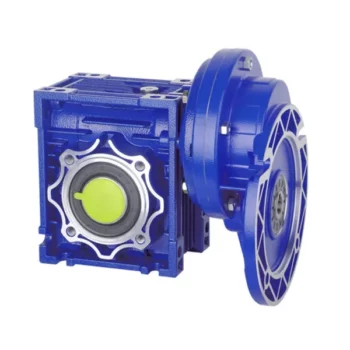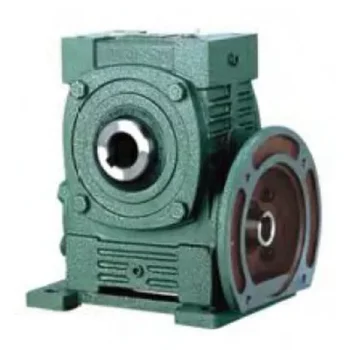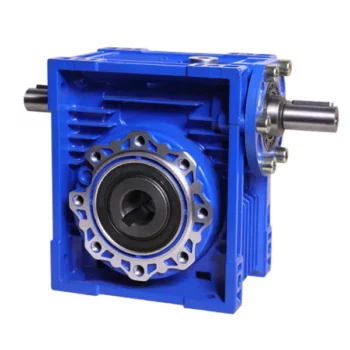Product Description
Characteristics:
(1)Large output torque
(2) Safe, reliable, economical and durable
(3) Stable transmission, quiet operation
(4) High heat-radiating efficiency, high carrying ability
(5) Combination of 2 single-step worm gear speed reducers, meeting the requirements of super speed ratio
(6) Mechanical gearboxes are widely used in the sectors,like foodstuff, ceramics, and chemical manufacturing, as well as packing, printing, dyeing and plastics
Technical data:
(1) Motor input power:0.06kw-15kw
(2) Output torque:4-2320N.M
(3) Speed ratio of worm gear peed reducer: 5/10/15/20/25/30/40/50/60/80/100
(4) With IEC motor input flange: 56B14/71B14/80B5/90B5…
Materials:
(1) NMRV571-NMRV090: Aluminium alloy housing
(2) NMRV110-150: Cast iron housing
(3) Bearing: CHINAMFG bearing & Homemade bearing
(4) Lubricant: Synthetic & Mineral
(5) The material of the worm mandrel is HT250, and the worm ring gear is ZQSn10-1.
(6) With high quality homemade bearings, assembled CHINAMFG oil seals & filled with high quality lubricant.
Operation&mantenance
(1)When worm speed reducer starts to work up to200-400 hours, its lubricant should be replaced.
(2)The gearbox need to replace the oil after 4000 hours.
(3)Worm reduction gearbox is fully filled with lubricant oil after finshed assembly.
(4)Lubricanting oil should be kept enough in the casing and checked at a fixed time.
Color:
(1) Blue / Light blue
(2) Silvery White
Quality control
(1) Quality guarantee: 1 year
(2) Certificate of quality: ISO9001:2000
(3) Every product must be tested before sending
| Motor power | Model | speed ratio | output speed | output toruqe |
| 0.06kw 1400rpm | NMRV030 | 5 | 280rpm | 2.0N.M |
| NMRV030 | 7.5 | 186rpm | 2.6N.M | |
| NMRV030 | 10 | 140rpm | 3.3N.M | |
| NMRV030 | 15 | 94rpm | 4.7N.M | |
| NMRV030 | 20 | 70rpm | 5.9N.M | |
| NMRV030 | 25 | 56rpm | 6.8N.M | |
| NMRV030 | 30 | 47rpm | 7.9N.M | |
| NMRV030 | 40 | 35rpm | 9.7N.M | |
| NMRV030 | 50 | 28rpm | 11.0N.M | |
| NMRV030 | 60 | 24rpm | 12.0N.M | |
| NMRV030 | 80 | 18rpm | 14.0N.M | |
| 0.09kw 1400rpm | NMRV030 | 5 | 280rpm | 2.7N.M |
| NMRV030 | 7.5 | 186rpm | 3.9N.M | |
| NMRV030 | 10 | 140rpm | 5.0N.M | |
| NMRV030 | 15 | 94rpm | 7.0N.M | |
| NMRV030 | 20 | 70rpm | 8.8N.M | |
| NMRV030 | 25 | 56rpm | 10.0N.M | |
| NMRV030 | 30 | 47rpm | 12.0N.M | |
| NMRV030 | 40 | 35rpm | 14.0N.M | |
| NMRV030 | 50 | 28rpm | 17.0N.M | |
| NMRV030 | 60 | 24rpm | 18.0N.M | |
| 0.12kw 1400rpm | NMRV030 | 5 | 280rpm | 3.6N.M |
| NMRV030 | 7.5 | 186rpm | 5.2N.M | |
| NMRV030 | 10 | 140rpm | 6.6N.M | |
| NMRV030 | 15 | 94rpm | 9.3N.M | |
| NMRV030 | 20 | 70rpm | 12.0N.M | |
| NMRV030 | 25 | 56rpm | 14.0N.M | |
| NMRV030 | 30 | 47rpm | 16.0N.M | |
| NMRV030 | 40 | 35rpm | 19.0N.M | |
| NMRV030 | 50 | 28rpm | 22.0N.M | |
| 0.18kw 1400rpm | NMRV030 | 5 | 280rpm | 5.3N.M |
| NMRV030 | 7.5 | 186rpm | 7.7N.M | |
| NMRV030 | 10 | 140rpm | 10.0N.M | |
| NMRV030 | 15 | 94rpm | 14.0N.M | |
| NMRV030 | 20 | 70rpm | 18.0N.M | |
| NMRV030 | 25 | 56rpm | 20.0N.M | |
| NMRV030 | 30 | 47rpm | 24.0N.M |
| Application: | Machinery, Reducer |
|---|---|
| Hardness: | Hardened |
| Type: | Worm and Wormwheel |
| Manipulate Way: | Robotics |
| Manufacturing Method: | Rolling Gear |
| Color: | Blue |
| Customization: |
Available
| Customized Request |
|---|

Maintenance Tips for Prolonging the Life of a Worm Gearbox
Proper maintenance is essential to ensure the longevity and reliable performance of a worm gearbox. Here are some maintenance tips to consider:
- Lubrication: Regularly check and replenish the lubricant in the gearbox. Use the recommended lubricant type and quantity specified by the manufacturer.
- Lubrication Schedule: Follow a lubrication schedule based on the operating conditions and manufacturer recommendations. Regular lubrication prevents friction, reduces wear, and dissipates heat.
- Temperature Monitoring: Keep an eye on the operating temperature of the gearbox. Excessive heat can degrade the lubricant and damage components.
- Cleanliness: Keep the gearbox and surrounding area clean from debris and contaminants. Regularly inspect and clean the gearbox exterior.
- Seal Inspection: Check for any leaks or damage to seals and gaskets. Replace them promptly to prevent lubricant leaks and contamination.
- Alignment: Ensure proper alignment between the worm and worm wheel. Misalignment can lead to increased wear and reduced efficiency.
- Torque Monitoring: Monitor the torque levels during operation. Excessive torque can cause overloading and premature wear.
- Regular Inspections: Periodically inspect all components for signs of wear, damage, or unusual noise. Replace worn or damaged parts promptly.
- Proper Usage: Operate the gearbox within its specified limits, including load, speed, and temperature. Avoid overloading or sudden changes in operating conditions.
- Expert Maintenance: If major maintenance or repairs are needed, consult the manufacturer’s guidelines or seek the assistance of qualified technicians.
By following these maintenance tips and adhering to the manufacturer’s recommendations, you can extend the lifespan of your worm gearbox and ensure its optimal performance over time.

Worm Gearbox vs. Helical Gearbox: A Comparison
Worm gearboxes and helical gearboxes are two popular types of gear systems, each with its own set of advantages and disadvantages. Let’s compare them:
| Aspect | Worm Gearbox | Helical Gearbox |
| Efficiency | Lower efficiency due to sliding friction between the worm and worm wheel. | Higher efficiency due to rolling contact between helical gear teeth. |
| Torque Transmission | Excellent torque transmission and high reduction ratios achievable in a single stage. | Good torque transmission, but may require multiple stages for high reduction ratios. |
| Noise and Vibration | Generally higher noise and vibration levels due to sliding action. | Lower noise and vibration levels due to smoother rolling contact. |
| Backlash | Higher inherent backlash due to the design. | Lower backlash due to meshing of helical teeth. |
| Efficiency at Higher Speeds | Less suitable for high-speed applications due to efficiency loss. | More suitable for high-speed applications due to higher efficiency. |
| Overload Protection | Natural self-locking feature provides some overload protection. | May not have the same level of inherent overload protection. |
| Applications | Commonly used for applications requiring high reduction ratios, such as conveyor systems and heavy-duty machinery. | Widely used in various applications including automotive transmissions, industrial machinery, and more. |
Both worm and helical gearboxes have their place in engineering, and the choice between them depends on the specific requirements of the application. Worm gearboxes are preferred for applications with high reduction ratios, while helical gearboxes are chosen for their higher efficiency and smoother operation.

What is a Worm Gearbox and How Does It Work?
A worm gearbox, also known as a worm gear reducer, is a mechanical device used to transmit rotational motion and torque between non-parallel shafts. It consists of a worm screw and a worm wheel, both of which have helical teeth. The worm screw resembles a threaded cylinder, while the worm wheel is a gear with teeth that mesh with the worm screw.
The working principle of a worm gearbox involves the interaction between the worm screw and the worm wheel. When the worm screw is rotated, its helical teeth engage with the teeth of the worm wheel. As the worm screw rotates, it translates the rotational motion into a perpendicular motion, causing the worm wheel to rotate. This perpendicular motion allows the worm gearbox to achieve a high gear reduction ratio, making it suitable for applications that require significant speed reduction.
One of the key features of a worm gearbox is its ability to provide a high gear reduction ratio in a compact design. However, due to the sliding nature of the meshing teeth, worm gearboxes may exhibit higher friction and lower efficiency compared to other types of gearboxes. Therefore, they are often used in applications where efficiency is not the primary concern but where high torque and speed reduction are essential, such as conveyor systems, elevators, automotive steering systems, and certain industrial machinery.


editor by CX 2023-09-13